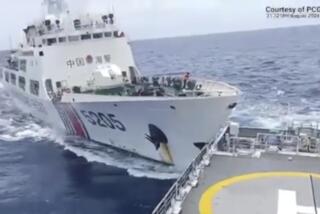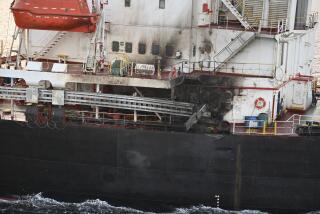China may fight piracy off Somalia
BEIJING — China signaled Wednesday that it may send warships to help fight pirates off the coast of Somalia, a sign of Beijing’s increasing willingness to flex its military muscle.
Although China has participated in United Nations peacekeeping operations in Africa, its navy has seldom left the Pacific region. The Global Times, a newspaper tied to the ruling Communist Party, called the possible deployment China’s “biggest naval expedition since the 15th century.”
China’s deputy foreign minister, He Yafei, was quoted by the state news agency as saying that China was “seriously considering sending naval ships to the Gulf of Aden and waters off the Somali coast for escorting operations in the near future.”
The remarks during a ministerial meeting of the U.N. Security Council were the first by a senior Chinese official confirming widespread speculation voiced in recent weeks.
The state-controlled press has been rallying support for such a mission with editorials that refer to China’s “responsibility” as well as to what the English-language China Daily called an opportunity to “get into the thick of the action.” An online poll published by the newspaper today reported that 90% of respondents supported the mission.
China is the only permanent member of the Security Council that has not joined the U.S. in a growing international fleet fighting a brazen wave of piracy launched from Somalia’s shores. Among other participants are Denmark, Greece, Turkey, Italy and Malaysia.
“As part of the U.N. Security Council, China has the responsibility to maintain the international peace and security. It also has to do so to protect its own interests,” said Liu Naiya, an Africa specialist at the Chinese Academy of Social Sciences in Beijing. “Fighting piracy is consistent with the global war against terrorism.”
For the Chinese, the urgency of the mission was underscored by an attack Wednesday in the Gulf of Aden on a ship owned by the China Communications Construction Co. The 30 crew members barricaded themselves in their cabins until they were rescued by a multinational force that reportedly swooped in with helicopters. Two other Chinese ships have been attacked since mid-November.
The Global Times reported today that two naval destroyers and a large depot ship would leave the port of Sanya on the South China Sea for an initial deployment of three months in the Gulf of Aden.
Although it has not yet been officially announced, the Somalia mission is generating much debate about what it signals for China’s rise as a global power. The United States has encouraged China’s participation in international peacekeeping operations, but views the rapid expansion of its navy as a possible threat in the event of war breaking out over Taiwan.
The navy of the People’s Liberation Army has not left the Pacific region except for what have been called goodwill tours, such as one in 2006 when two ships visited San Diego.
Much of China’s imported oil passes from the Red Sea through the Gulf of Aden to the Indian Ocean.
China also has extensive business interests in Africa, importing oil and minerals, and building roads and other infrastructure, particularly in Sudan, where its ties to the government have drawn criticism from Darfur activists. It has participated in U.N. peacekeeping operations in Sudan, the Democratic Republic of Congo, Liberia and elsewhere. Stratfor, a geopolitical consultancy, wrote that a deployment to Somalia would be a significant step in the evolution of the Chinese navy. “As mainly a land power, China has spent little time through much of its history worrying about a significant naval capability,” the Austin, Texas-based firm stated. The Somalia mission “offers the Chinese navy new opportunities for training in extended operations far from the Chinese mainland,” it said.
Pirates operating out of northern Somalia are suspected in more than 100 attacks this year in the Gulf of Aden and Indian Ocean and are believed to be holding 17 ships and more than 250 crew members hostage, demanding millions of dollars in ransom.
The Security Council on Tuesday unanimously approved a U.S. resolution that would authorize operations against the pirates’ hide-outs on land.
--
Nicole Liu of The Times’ Beijing Bureau contributed to this report.
More to Read
Sign up for Essential California
The most important California stories and recommendations in your inbox every morning.
You may occasionally receive promotional content from the Los Angeles Times.










